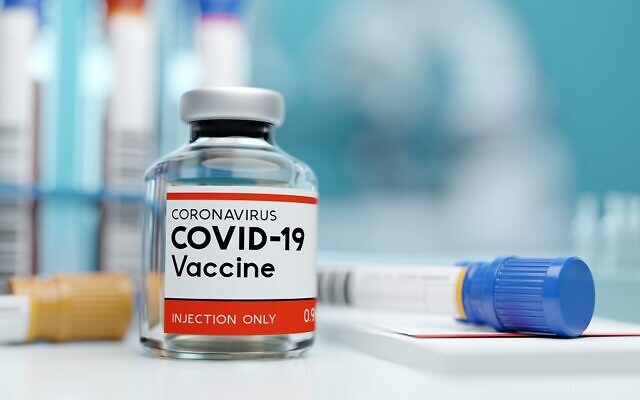2020 YIR: COVID-19 Vaccines Have Jewish Links and Vaccine Coverage
This year, the AJT has been doing ongoing coverage regarding the development of the COVID vaccine.
Dave Schechter is a veteran journalist whose career includes writing and producing reports from Israel and elsewhere in the Middle East.
November-December 2020
Throughout the COVID-19 pandemic, the grail has been development of a vaccine that could slow, if not arrest, the spread of the potentially fatal virus.
As the novel coronavirus swept across the United States, with devastating effect in parts of the Atlanta area and in rural Georgia, pharmaceutical companies worked at a pace uncommon to their usually painstaking process.
The federal government called its contribution to the effort “Operation Warp Speed,” borrowing a term familiar to Star Trek fans. Billions of taxpayer dollars were made available to aid vaccine research.
According to the Johns Hopkins School of Medicine, as of Dec. 21, more than 77 million cases of COVID-19 had been reported worldwide, with more than 17.8 million in the United States. That includes 509,000 confirmed cases in Georgia, according to the state’s Department of Public Health.
The global death toll was nearly 1.7 million with 317,000 deaths in the U.S., including 9,400 confirmed deaths in Georgia, the DPH reported.
Pfizer was working with BioNTech, a German firm founded by the children of Turkish immigrants. Albert Bourla, CEO of Pfizer, whose parents survived the Nazi devastation of the Jewish community in Thessaloniki, Greece, passed on the government money. “Basically I gave them an open checkbook so that they can worry only about scientific challenges, not anything else. And also, I wanted to keep Pfizer out of politics,” Bourla told CBS News Face the Nation Sept. 13.
Pfizer did negotiate a production and delivery deal with the U.S. government, worth up to $1.95 billion, to secure an initial 100 million doses of its vaccine by March 2021, with an option to purchase more.
Another firm, Moderna, which accepted $2.5 billion in development aid, had begun work on potential pandemic responses even prior to COVID-19. The U.S. initially agreed to purchase 100 million doses of its vaccine and this month ordered an additional 100 million.
Pfizer/BioNTech and Moderna were among more than a dozen efforts in late-stage trials.
What made their announcements in November all the more stunning was not only the speed at which the vaccines had been produced, but that the results exceeded what had been anticipated in terms of effectiveness. “How fast we moved is not something you could expect from the big, powerful pharma. This is speed that you would envy in an entrepreneurial founder-based biotech,” Bourla told Forbes magazine.
First Pfizer on Nov. 9, and then Moderna on Nov. 16, announced that large-scale tests, involving 30,000 or more volunteers, produced effectiveness rates of 90 percent and better in preventing infection among people who previously had not been infected with SARS-CoV-2, the virus behind COVID-19.
Moderna’s chief medical officer, Tal Zaks, is an Israeli with degrees from Ben-Gurion University. Zaks told the Axios news website that he kept in mind his mother, a woman in her 80s living in the Israeli city of Ra’anana. “I want these data out as soon as I humanely can possibly get them. We have been working days, nights, 24/7 . . . I don’t think this was humanly possible to do any sooner,” he said.
The Moderna announcement was cause for celebration at Emory University, where a portion of the phase one vaccine human trials, involving several dozen volunteers age 56 and older, began in March. Those trials yielded evidence of “neutralizing antibodies” in quantities comparable to what was found in people who had survived COVID-19. The large-scale testing included several hundred volunteers at three Atlanta sites: The Hope Clinic of the Emory Vaccine Center, the Emory-Children’s Center, and Grady Health’s clinic.
On Dec. 11, the Pfizer/BioNTech vaccine received the emergency use approval needed from the U.S. Food and Drug Administration for inoculation of people age 16 and older. Moderna was expected to receive similar approval in the days to follow. The hope was that by the end of 2020, approved vaccines would be available, initially to residents of long-term care facilities and to doctors, nurses and other medical personnel working with COVID patients.
- Dave Schechter
- World
- Year in Review
- COVID
- COVID-19
- Coronavirus
- pandemic
- COVID Vaccine
- Pfizer
- Moderna
- United States
- Atlanta
- Operation Warp Speed
- Star Trek
- Johns Hopkins School of Medicine
- Department of Public Health
- BioNTech
- Albert Bourl
- Greece
- Forbes
- Tal Zaks
- Israel
- Ben-Gurion University
- Emory University




comments